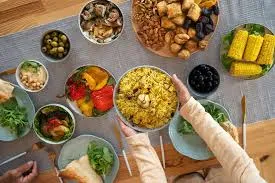As we explore the rich and diverse world of halal meals, it’s essential to understand the significance behind this dietary choice. Halal, meaning “permissible” in Arabic, refers to food that adheres to Islamic law, ensuring that it meets specific ethical and health standards. For many, choosing halal isn’t just about dietary restrictions; it embodies a lifestyle rooted in faith and cultural identity.
In recent years, the popularity of halal meals has surged beyond the Muslim community, appealing to a broader audience seeking quality and ethical food options. From tantalising street food to gourmet dining experiences, halal cuisine offers a delectable array of flavours that everyone can enjoy.
This is where Cookt steps in—bringing halal dining to your table with convenience, authenticity, and flavour. By curating meals that honour tradition while embracing modern tastes, Cookt makes it easier than ever to enjoy halal cuisine without compromise. Join us as we dive deeper into the principles of halal eating, the benefits it brings, and why it’s worth considering for our next meal.
Contents
Understanding Halal Meals
Halal meals align with Islamic dietary laws and reflect moral and health standards. These meals play a vital role in our lives, symbolising faith and cultural identity while gaining popularity in diverse culinary circles.
Definition of Halal
Halal, an Arabic term meaning “permissible,” refers to food and drink allowed under Islamic law. Key criteria for halal meals include the source of the food, the method of slaughter, and the absence of prohibited substances. For instance, meat must come from healthy animals slaughtered by a Muslim who invokes God’s name during the process. Additionally, halal guidelines prohibit ingredients such as pork and alcohol, ensuring that all components meet the necessary standards.
Importance of Halal Compliance
Halal compliance holds significant importance for Muslims and many non-Muslims seeking ethical food choices. Following halal principles ensures dietary habits align with religious beliefs while promoting health consciousness. Halal meals often utilise quality ingredients, emphasising freshness and care in preparation. Observing halal compliance cultivates a sense of community among individuals who share similar values, contributing to a greater appreciation of cultural diversity in food practices.
Types of Halal Meals
Various types of halal meals cater to diverse dietary preferences while adhering to Islamic law. We explore two primary categories: meat-based halal meals and vegetarian and vegan halal options.
Meat-Based Halal Meals
Meat-based halal meals consist of various types of meat that comply with Islamic dietary laws. These meals must originate from animals slaughtered in accordance with guidelines outlined in the Quran. Key characteristics include:
- Halal Meat Sources: Sources like beef, lamb, chicken, and fish are deemed halal when processed correctly.
- Slaughter Method: The animals must be slaughtered by a qualified person, invoking the name of Allah before the act.
- Prohibition of Certain Ingredients: Meals must exclude pork, blood, and any alcohol products.
- Health Standards: Animals must be healthy at the time of slaughter, reflecting hygienic practices that enhance food safety.
Examples of popular meat-based halal meals include chicken biryani, lamb kebabs, and beef kofta.
Vegetarian and Vegan Halal Options
Vegetarian and vegan halal options offer a diverse range of meals that do not contain any animal products while adhering to halal principles. Features include:
- Plant-Based Ingredients: Meals utilise ingredients such as grains, legumes, vegetables, and fruits, ensuring compliance with halal standards.
- No Prohibited Additives: These options avoid all forms of alcohol and non-halal animal-derived ingredients, like certain gelatine types.
- Cultural Dishes: Traditional dishes such as falafel, hummus, and vegetable curry serve as popular vegetarian and vegan halal meals.
By choosing vegetarian and vegan halal options, individuals enjoy ethical eating while respecting their cultural beliefs.
Preparing Halal Meals
We focus on careful preparation to ensure halal meals meet Islamic standards while delivering exceptional taste and quality.
Sourcing Halal Ingredients
We source halal ingredients from trusted suppliers to ensure compliance with Islamic dietary laws. Meats must come from animals slaughtered according to Islamic principles, meaning they undergo a specific method of slaughter that enhances the quality and ethical standards of the food. We look for halal certification labels on products, indicating they comply with these regulations. For plant-based options, it’s crucial to verify that no non-halal additives are present in products such as sauces, condiments, and processed foods. By sourcing from reputable vendors, we ensure our meals reflect our commitment to halal principles.
Cooking Methods for Halal Meals
We employ various cooking methods to prepare halal meals that retain flavour and nutrients. Techniques like grilling, steaming, and baking maximise taste without compromising halal integrity. When marinating meats, we use spices and herbs free from alcohol-based marinades, ensuring all ingredients remain halal-compliant. For vegetarian and vegan dishes, we ensure all cooking utensils and surfaces are free from cross-contamination with non-halal products. By following these methods, we create delicious meals that honour our dietary beliefs while delighting our palates.
Benefits of Eating Halal
Eating halal offers numerous advantages that align with health and ethical considerations. These benefits underscore why halal meals resonate with a broad audience.
Health Benefits
Halal meals often adhere to stringent health standards. These meals exclude non-halal substances like pork and alcohol, reducing health risks. Halal meat comes from animals treated humanely and fed a healthy diet, leading to higher-quality protein sources. For instance, studies show that halal meat can contain lower levels of harmful bacteria compared to non-halal options, promoting safer food consumption. Furthermore, halal preparation methods, such as the prohibition of specific additives and preservatives, favour healthier eating patterns. Regularly opting for halal can enhance overall well-being, contributing to a balanced diet.
Ethical Considerations
Halal dietary practices emphasise ethical sourcing and animal welfare. Animals must undergo a humane slaughter process, ensuring minimal suffering, which aligns with the values of compassion and respect toward living beings. By choosing halal, we support suppliers and producers that prioritise ethical practices and responsible farming. Additionally, halal compliance encourages sustainable agriculture, reinforcing environmentally friendly methods that benefit the planet. As consumers, our choices matter; selecting halal meals reflects our commitment to ethical consumption and positively impacts the community and the environment.
Conclusion
Embracing halal meals goes beyond dietary choices; it’s about honouring our values and beliefs. As we explore diverse culinary options within the halal framework, we find a rich tapestry of flavours and traditions that cater to everyone. By prioritising ethical sourcing and health-conscious practices, we contribute to a sustainable future while enjoying delicious meals.
Whether we’re savouring a classic lamb kebab or a fresh falafel, halal cuisine invites us to celebrate our cultural identities and share them with others. Let’s continue to appreciate the benefits of halal eating and inspire those around us to join in on this fulfilling journey.







